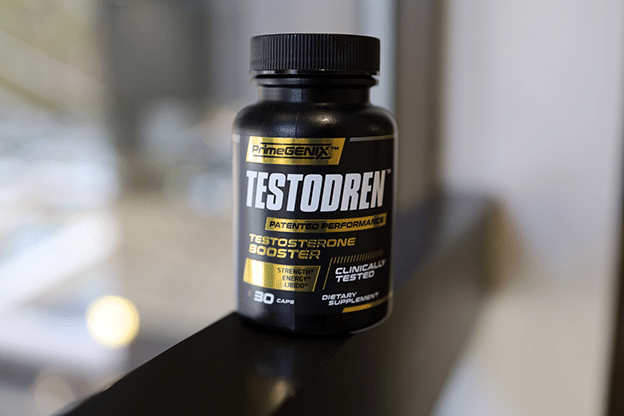Declining testosterone levels are a natural part of the aging process in men. Starting around age 30, our testosterone levels (T levels) begin to drop by approximately 1% each year – regardless of our overall health.
Testosterone is well-known to be the primary sex hormone in men, although it plays a role in much more than our sexual function. Testosterone’s main contribution during puberty is the deepening of the voice, the development of body hair, and the growth of the male sexual organs. If you are experiencing low testosterone you should also read our post, “3 Testosterone Killers (And Why You Need To Get Them Out Of Your House)” only on our blog.
In addition to regulating sex drive, the testosterone hormone is also responsible for:
- Muscle growth
- Red blood cell and sperm production
- Fat distribution and storage
- Increasing bone mass
- & Mental clarity
If you are experiencing a testosterone deficiency, you may be looking for ways to boost your T levels. There are a variety of medical solutions available, including testosterone replacement therapy, to address this issue. Fortunately, there are also many natural ways to increase and maintain healthy testosterone levels.
In this article, we’ll talk about the ways low testosterone can negatively affect your daily life and present you with some natural alternatives to counteract the symptoms of testosterone deficiency.
Let’s start by understanding some of the most common causes of low testosterone.
Causes of Low Testosterone Levels
Decreased testosterone levels can be caused by several factors depending on your age. Some of the most common conditions are:
- Hypogonadism, also known as Testosterone Deficiency Syndrome or Gonad Deficiency, is a condition where the testicles produce very little or no testosterone. This condition can affect men of all ages.
- Andropause, sometimes called male menopause, refers to the symptoms associated with decreased testosterone production usually beginning around age 40.
There are many possible causes of hypogonadism and andropause, including:
- Hormone disorder (i.e. pituitary gland disease)
- Genetic conditions (i.e. Klinefelter syndrome)
- Testicular injury or infection
- Certain treatments or medications (i.e. chemotherapy or corticosteroids)
- Alcohol or drug abuse
- Extreme weight loss or weight gain
- Excess estrogen (from an environmental or external source)
Although some of these may seem out of your control, that doesn’t mean there isn’t anything you can do to offset declining T levels. Keep reading to learn about how you may be able to boost low testosterone.

Negative Effect: Low T Affects Your Gains
It’s relatively common knowledge that testosterone is an important hormone in building muscle in men. This means that if testosterone levels decrease it can lead to a loss of muscle mass, strength, and, in many cases, self-esteem.
If you pride yourself on your physique and spend hours every week in the gym, the sudden appearance of “man boobs” (aka gynecomastia) or “love handles” can be devastating. What’s worse is the realization that no amount of extra hours spent working out will reduce this unwanted fat accumulation.
What Does Science Say?
Low testosterone levels are associated with unfavorable changes to our body composition1. A proven sign of low testosterone is loss of muscle, also called muscle wasting. Muscle wasting is characterized by losing muscle bulk or strength.
Our muscle cells have testosterone receptors, known as androgen receptors. When our testosterone levels are normal, testosterone binds to these receptors and maintains muscle fibers. If testosterone is low, maintenance of muscle fibers stops and muscle begins to degrade.
In the absence of testosterone, or a great reduction in testosterone levels, the estrogen hormone takes over. When estrogen levels increase, muscles can turn to fat. In serious cases, increased estrogen levels cause fat to increase around your midsection and chest.
Fat cells increase our bodies’ production of aromatase, an enzyme that converts testosterone into estrogen. More estrogen leads to more fat deposits in our hips, thighs, chest, and waist.
The Fix: Minimize Muscle Weakness by Adjusting Your Diet
The symptoms of low T can be minimized by making changes to your lifestyle and diet. While these changes may not be enough to raise your testosterone levels significantly on their own, they can still make an impact.
Consider whether your diet contains a lot of saturated fats as this has been shown to negatively impact testosterone levels. If you find that you are consuming high levels of saturated fats, try incorporating zinc, antioxidant vitamins, and omega-3 fatty acids into your diet. These have all been shown to support natural testosterone production.
Eat a healthy, well-balanced diet rich in nutrient-dense whole foods and lean protein, while also reducing your caffeine and alcohol consumption.
Negative Effect: Low T Affects Your Health
While the effects of low T on your physical appearance may feel important, mainly because you can see changes, its effect on your physical health should be equally discussed. Decreased testosterone levels can lead to numerous health issues such as:
- Fatigue
- Osteoporosis
- Cardiovascular disease
- Diabetes
- Metabolic Syndrome
Our energy levels and cholesterol metabolism can also be affected, which can in turn affect our physical appearance (i.e. weight gain).
What Does Science Say?
Testosterone can increase your risk of heart attack and stroke, whether you have too little or too much testosterone. Studies have shown that maintaining normal levels of testosterone can protect your heart from potential damage2.
Testosterone deficiency has been linked to an increased risk of diabetes in men3. The testosterone hormone plays a role in helping your body produce more glucose (aka blood sugar), in response to insulin.
Low testosterone can affect insulin resistance, causing your body to produce more insulin to maintain normal glucose levels. This excess glucose is then stored in fat cells, which can lead to obesity and type 2 diabetes.
The Fix: Improve Your Health by Getting Better Sleep
Lack of sleep or irregular sleep habits can have adverse effects on the hormones your body needs to function correctly. This includes testosterone. One study even found that men who don’t get enough sleep can experience a drop in testosterone levels4.
Maintaining a regular sleep schedule leads to better regulation of your circadian rhythm. Therefore getting at least six to eight hours of sleep, and getting to bed around the same time each night, can increase your chances of supporting consistent testosterone levels.
It’s been shown that higher levels of testosterone are released within the first few hours after you wake. One of the most important things you can do for your health, and testosterone levels, is to make sleep a priority.

Negative Effect: Low T Affects Your Mood
Testosterone’s role in men’s health is not just limited to your physical and sexual well-being, it also plays a pretty significant role in your state of mind. Low testosterone symptoms have been known to negatively affect your emotional health.
What Does Science Say?
Research hasn’t definitively discovered exactly why testosterone has such a huge impact on men’s mental state. Separate studies conducted, however, have found links between low testosterone levels in men and a decline in mental wellness5.
You may experience an increase in irritability and stress or you might be more prone to mood swings. And in some cases, low testosterone can lead to greater symptoms of depression. This is partly because our brains have testosterone receptors that directly affect men’s mental health.
Even when depression is not directly caused by having low testosterone, the distress associated with other symptoms can lead to emotional distress. This can trigger a downward spiral, which may eventually increase feelings of depression. This means that even though it may be an indirect symptom of low testosterone, depression due to low T levels can wreak havoc in our lives.
The Fix: Boost Your Mood by Staying Active
We can combat some of the effects of low testosterone on our mood by increasing our level of activity. Exercise isn’t only effective at improving your physical health and increasing muscle size, it can also be a great way to boost your overall mood.
The good news is you don’t even have to be a gym rat to reap the benefits. Even pursuing moderate amounts of exercise has been scientifically proven to have a profound impact.
Moderate just means your heart rate increases and you breathe a little heavier than normal, but not enough to feel out of breath. For example, if you’re walking with a friend you should be able to carry on a light conversation, but you wouldn’t be able to sing a song.
Negative Effect: Low T Affects Your Relationship
The most well-known effects of low testosterone are reduced sex drive, infertility, and erectile issues. As you know by now, these are not the only concerns when it comes to decreased T levels. For most men, however, they may feel more significant than other symptoms.
This is primarily because of their effect on our romantic relationships. When we experience a decrease in energy levels or an increase in anxiety, our ability to perform is diminished. Sometimes, our sexual confidence takes a hit as a result.
When combined with negative changes to our physical appearance, mental health, and physiological health, it’s hard not to feel more insecure than normal.
What Does Science Say?
Low testosterone can reduce the amount of satisfaction you gain from having sex. As a result, low libido is one of the most common reasons men visit the doctor to have their testosterone levels checked6.
Studies have shown that a decline in T levels is not solely responsible for an increase in sexual disorders such as erectile difficulties. This is because factors like our psychological and physical health also play a role7.
Additionally, men with low testosterone levels and men diagnosed with Major Depressive Disorder report similar high rates of sexual dysfunction8.
The Fix: Revive Your Sex Life by Reconnecting With Your Partner
If you’re suffering from low testosterone, it can be difficult to be always ready for sex. When you’re used to a more robust sex life, this lack of arousal can be devastating to you. And you may perceive added pressure from your partner.
Rather than allow this line of thinking to go unchecked, take the time to communicate with your partner. Let them know that your diminished sex drive isn’t because of them. You may not realize it, but they could be dealing with insecurities about your decreased sexual function.
Try being active together such as exercising or taking a couples yoga class or scheduling more date nights. Engage in gentle touching, massages, and cuddling, without the goal of it leading to sex. Discuss each of your sexual fantasies or read some erotic fiction together. Rediscovering your connection can lead to a renewed sense of arousal.

How to Naturally Boost Your Testosterone Levels
We’ve discussed the various ways you can adjust your diet and lifestyle to boost your testosterone levels, but there’s one more suggestion that has successfully helped thousands of men naturally raise their testosterone production.
Testosterone supplements are an all-natural, scientifically-proven means of increasing your testosterone levels. Studies have shown that supplementing for as little as one month can have a positive effect on testosterone levels in men. One of the most popular testosterone supplements is Testodren™ by PrimeGENIX.
What is Testodren™?
Testodren™ is a multipurpose supplement made with all-natural ingredients. It is optimally formulated to help naturally restore your testosterone levels.
In addition to encouraging your body’s natural testosterone production, this patented formula helps you:
- Build muscle mass quicker
- Lose excess weight easier
- Improve cognitive function and mental awareness
- Enhance sexual function, stamina, and drive
- Increase energy levels during workouts
- Reduce post-workout recovery time
Testodren™ comes in bottles containing 30 capsules, so you’ll only have to make room for one pill in your daily routine. You can only purchase Testodren™ from the official website, but you’ll gain access to bulk discounts and a money-back guarantee.
How to Get the Most Out of Testodren™
The best results are experienced when you take your dose consistently. Optimal results can take as long as two months. However, noticeable changes have been seen in as little as four weeks. When combined with a healthy, well-balanced diet and regular exercise, some men have even reported seeing changes in only two weeks.
Based on the overwhelming number of positive customer testimonials, one thing is clear – Testodren™ is the real deal. Why not find out for yourself?
Also check out our post, “How to Safely and Effectively Boost T-Levels – Naturally” for more information on getting your testosterone up.
Endnotes
- https://www.ncbi.nlm.nih.gov/pmc/articles/PMC6119844/
- https://www.ncbi.nlm.nih.gov/pmc/articles/PMC5512682/
- https://www.ncbi.nlm.nih.gov/pmc/articles/PMC5793809/
- https://www.ncbi.nlm.nih.gov/pmc/articles/PMC4445839/
- https://pubmed.ncbi.nlm.nih.gov/24016385/
- https://pubmed.ncbi.nlm.nih.gov/25382540/
- https://pubmed.ncbi.nlm.nih.gov/29704917/
- https://pubmed.ncbi.nlm.nih.gov/19796059/


